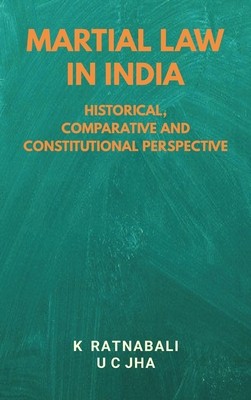
- We will send in 10–14 business days.
- Author: Ratnabali
- Publisher: VIJ BOOKS INDIA
- ISBN-10: 9389620686
- ISBN-13: 9789389620689
- Format: 15.2 x 22.9 x 1.8 cm, hardcover
- Language: English
- SAVE -10% with code: EXTRA
Reviews
Description
Martial law is not a body of substantive law, but rather summary powers employed by the military commanders when the ordinary rule of law is suspended. Under the British rule, martial law was proclaimed on many occasions in different territories in India, wherein excessively harsh provisions were used to humiliate Indians. The framers of the Indian Constitution did not make any express provision about martial law under the Constitution. However, an implied reference to the possibility of imposing martial rule in India has indicated in Article 34 wherein it provides that an Act of Indemnity may be passed by the Parliament in respect of acts done under martial law.
This book covers the historical perspective of martial law in India and compares it with a few other countries. The possibility of arrest and detention of an offender during martial law, the rights to the habeas corpus in such circumstances, and the power of constitutional courts to issue such a writ has been analyzed. The book examines the powers of the military commander under the Armed Forces Special Powers Act and critically evaluates whether it amounts to the de facto proclamation of martial law. The Book also analyses whether the proclamation of martial law is feasible in India in the future. This book is intended for not only those who are involved in promoting, protecting, and enforcing human rights, but also for those engaged in the security of the country. It will of relevance to parliamentarians, government officials, military authorities, judges, lawyers, and members of the civil society who have a stake in the armed forces.
EXTRA 10 % discount with code: EXTRA
The promotion ends in 19d.18:01:26
The discount code is valid when purchasing from 10 €. Discounts do not stack.
- Author: Ratnabali
- Publisher: VIJ BOOKS INDIA
- ISBN-10: 9389620686
- ISBN-13: 9789389620689
- Format: 15.2 x 22.9 x 1.8 cm, hardcover
- Language: English English
Martial law is not a body of substantive law, but rather summary powers employed by the military commanders when the ordinary rule of law is suspended. Under the British rule, martial law was proclaimed on many occasions in different territories in India, wherein excessively harsh provisions were used to humiliate Indians. The framers of the Indian Constitution did not make any express provision about martial law under the Constitution. However, an implied reference to the possibility of imposing martial rule in India has indicated in Article 34 wherein it provides that an Act of Indemnity may be passed by the Parliament in respect of acts done under martial law.
This book covers the historical perspective of martial law in India and compares it with a few other countries. The possibility of arrest and detention of an offender during martial law, the rights to the habeas corpus in such circumstances, and the power of constitutional courts to issue such a writ has been analyzed. The book examines the powers of the military commander under the Armed Forces Special Powers Act and critically evaluates whether it amounts to the de facto proclamation of martial law. The Book also analyses whether the proclamation of martial law is feasible in India in the future. This book is intended for not only those who are involved in promoting, protecting, and enforcing human rights, but also for those engaged in the security of the country. It will of relevance to parliamentarians, government officials, military authorities, judges, lawyers, and members of the civil society who have a stake in the armed forces.


Reviews